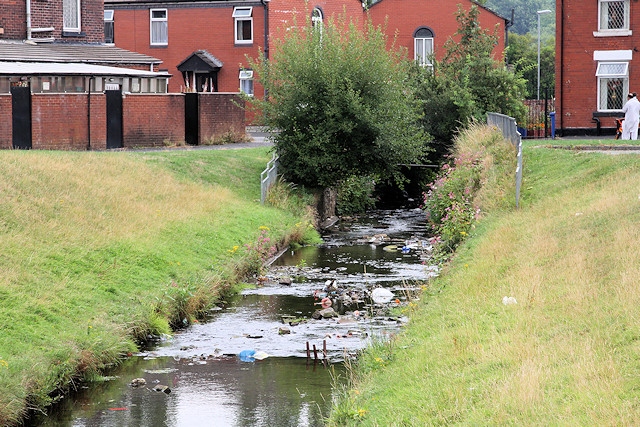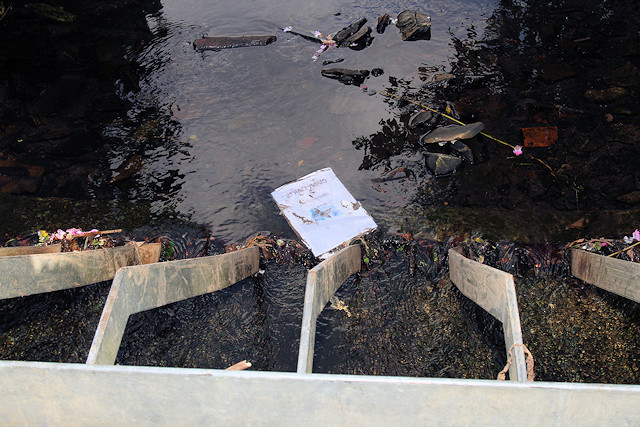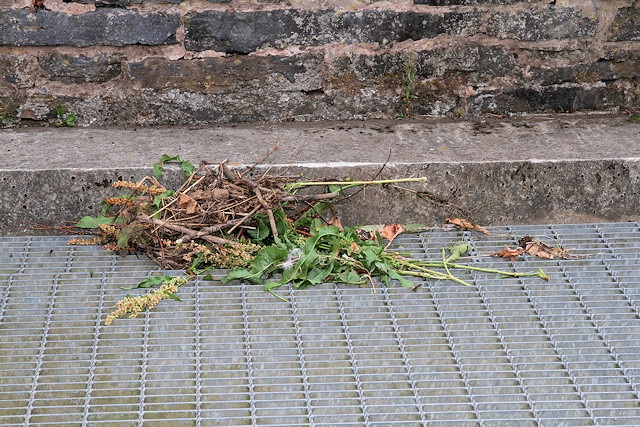Everyday flood prevention with the Environment Agency
Date published: 11 August 2018

Debris in Hey Brook
Scroll down for Video
Rochdale Online caught up with the Environment Agency earlier this week to learn more about the day-to-day work carried out to prevent flooding – small, but necessary action.
Daniel Street, Whitworth
Here we witnessed the clearing of a debris screen and the clearing of a hydro-brake (video at bottom of article).
The debris screen acts as a filter for a culvert further down the river under the nearby factory, keeping all kinds of foreign bodies from blocking it. Culverts are structures that allow water to flow under a road, or similar obstructions.


The screen needs regular clearing to remove any debris which may cause water build up and increase the risk of a flood.
The structure has several types of lock to prevent trespassing, and all parts checked and cleaned on a regular basis, with the silicone seals replaced when weathered.
Mike Vernon, incident planning and engagement advisor with the Environment Agency said: “In times of drought, or low flow like this, we would check the screen once a week to clear it.
“During intense weather, we check before, during and after. We could check this culvert, then go to the one in Milnrow and one on Halifax Road, and then come back here to start again.”
A telemetry system takes readings of the water levels both in front and behind the screen and is continuously monitored via computer. If the difference between the levels reaches half a metre, an alarm will alert the team, who will attend and inspect the blockage.
When water levels are too high to access the platform over the river, debris is removed via alternate means until the water has subsided enough for access.
The nearby field acts as a flood relief basin, using a hydro-brake which helps manage drainage.
We witnessed the area leading to the mechanism being cleared, so that water can flow without obstruction.
The workers then clean themselves down with special disinfectant to prevent carrying invasive species such as knotweed or balsam to other sites.



Hey Brook, Rochdale
On the stretch of the brook close to Hector Avenue, the team responded following a complaint of debris in the water. On our arrival, we found several footballs, a discarded bicycle, numerous plastic bags and multiple children’s toys littering the river and its banks.



Mr Vernon explained: “The team will inspect the water and the bank for any possible flood risks, before reporting back so we know what equipment is needed to remove it.”
He added: “A lot of it is educating people about disposing of items correctly. Any piece of litter on the ground can be blown into the waterway, which eventually makes its way into the ocean.
“We do find a lot of larger items in water courses, such as bicycles, children’s toys and cars, which can cause flooding if not dealt with quickly. And the costs of removing the items quickly add up.”

The items deemed a flood risk were removed the following day on Wednesday (9 August).


Mike Vernon, incident planning and engagement advisor with the Environment Agency explains how the hydro-brake is cleared to prevent flooding
©Rochdale Online
Do you have a story for us?
Let us know by emailing news@rochdaleonline.co.uk
All contact will be treated in confidence.
Most Viewed News Stories
- 1Middleton school hails another outstanding inspection result
- 2Drugs and cash seized during morning raids at suspected stash houses
- 3Former councillor and hospital campaigner Jean Ashworth has died
- 4No trams between Oldham and Rochdale this Sunday
- 5Northern Healthcare opens supported living service in former Rochdale hotel
To contact the Rochdale Online news desk, email news@rochdaleonline.co.uk or visit our news submission page.
To get the latest news on your desktop or mobile, follow Rochdale Online on Twitter and Facebook.


